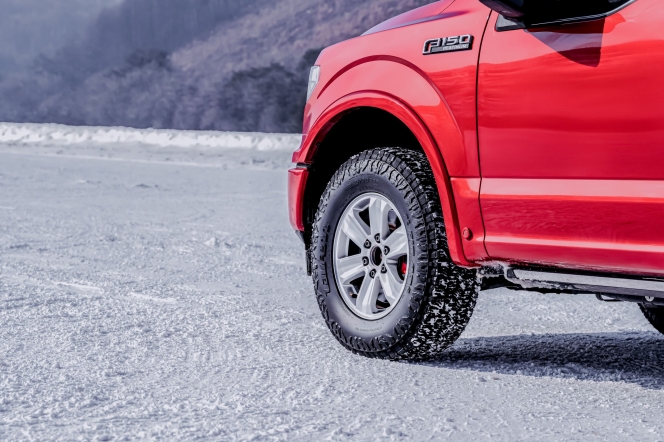
How do you view the changes happening in tyre retailing, the way it goes more and more digital?
This is the inevitable outcome of the internet and the ease it provides for researching tyre types, performance attributes, pricing and communicating with a tyre store. The Covid-19 pandemic has fast-forwarded consumer use and acceptance of online purchasing and communication with retailers, in general, so I think this will occur with tyre retailing. In the U.S., it is estimated that traditional brick-and-mortar retailers are seeing more than 15% of tyre revenues coming from online sales. This is likely to grow, although the majority of replacement tyres likely will continue to be sold and serviced in the more traditional manner of customers interacting with the tyre store directly. Tyre retailers will have to offer both online and in-store operations to be able to service all tyre customers.
How do you see retailing strategies changing in the changing business environment?
I think convenience will be the buzzword going forward. Thanks to the growth of general online sales, consumers are becoming accustomed to purchasing products and services via the Internet and having products delivered directly to their homes. This also applies to tyre sales and service. Tyre dealers will need to have an effective website that includes information on various tyres and brands, tyre pricing and the ability to make an appointment. Tyre consumers also will come to expect periodic updates via texts as their vehicles are being serviced. Customers choosing to sit in the waiting room while new tyres are installed or serviced will want to be able to connect to the shop’s Wi-Fi to do work or surf the Internet. The waiting room will need to be clean and inviting. In addition, there likely will be growth in mobile tyre retailing and service, where the tyre shop comes to customer, either at home or work. Why? For convenience.
How is TIA involved in this sector as an industry organisation?
The Tire Industry Association (TIA) serves the tyre retailing sector primarily in two ways. It offers certified tyre service training to tyre technicians and serves as a watchdog for tyre dealers concerning local, state and federal legislation that could negatively impact their businesses. Safety is the watchword when it comes to training, both for the technician as well as the vehicle owner. Over the past two decades, TIA has trained more than 200,000 tyre technicians worldwide on the proper ways to mount, demount and service all types of tyres. Through this, TIA training has helped raise the professionalism of the tyre service operation by teaching technicians the proper ways to service tyres. This in turn has helped make the driving public safer.
Through its Government Affairs efforts, TIA focuses on representing the interests of tyre retailers and the tyre industry in tyre-related legislative issues that could negatively impact the industry and the driving public. Each year, the association monitors scores of proposed bills and legislation and weighs in to fight for the best interests of the industry and tyre retailers.
The association also offers various member benefits that help tyre dealers reduce costs and better run their businesses.

What is your take on online retailing? What are its advantages as well as disadvantages?
Online retailing is here to stay and will continue to grow. The advantages are obvious. It allows tyre customers to make tyre service appointments any time day or night, to research products, do comparison shopping all without leaving their own home. There is a lot of upside to online retailing. The tyre dealer gains from online retailing because it generates business in a sense automatically and helps in tracking sales and inventory. But there are downsides, as well.
Today, many tyre makers have begun selling tyres direct to consumers via the Internet, bypassing the dealers and using them only as installers. This has upset many dealers, as they lose out on the tyre sale and only generate revenue via the installation charge. Thus, it is crucial for tyre dealers to have their own online tyre operation, in addition to their brick-and-mortar stores, so when consumers are searching the Internet to purchase a tyre, the tyre dealership can not only make the tyre sale online but also schedule the installation. In addition, savvy dealers will use the opportunity to turn that installation customer into their own tyre and service customer in the future.
Another downside to online retailing is it is more difficult for dealers to build a personal relationship with the customer. One of the strengths of the independent tyre shop is the development of personal relationships and trust with customers. This customer loyalty has served tyre dealers well for over 100 years and kept the independent tyre dealer as the No. 1 channel for the purchase of replacement tyres in the U.S. I don’t see that changing dramatically. Tyres are a major purchase for most consumers and most vehicle owners don’t understand these products. They rely on their trusted independent tyre dealer to guide them in selecting the right tyre at the right price. Online retailing makes developing and retaining that personal relationship more difficult, but I expect the entrepreneurial spirit of tyre dealers to find a way to overcome this issue.
What is your take on tyre manufacturers doing their own retailing?
There is nothing wrong with tyre manufacturers operating their own retail tyre store chains. Many do, although this does put them into a competitive situation with their own independent tyre dealer customers. Independent tyre retailers are used to various types of competitors, from tyre company stores, to auto dealerships, to mass merchandisers, to auto service shops and oil change outfits that sell tyres. Now they are contending with online tyre sellers. Historically, independent tyre stores have overcome their competitors through their deep knowledge of the tyre business, their business savvy, their close relationships with customers and ability to evolve and make decisions quickly. I don’t see this changing, even with the growth in online tyre retailing. (TT)
Michelin Introduces XHA3 Earthmover Tyre At ConExpo 2026
- By TT News
- March 04, 2026

Michelin North America, Inc. has launched the Michelin XHA3 tyre at ConExpo 2026. The product is the next generation in the company’s loader and grader range, succeeding the XHA2 model.
The XHA3 replaces several previous lines, including the XHA2, XADN+, XAD65 and XLD. According to the company, this launch represents its most significant innovation in the earthmoving segment in over a decade.
The new tyre has been engineered to meet the requirements of modern construction machinery, which now operate with higher loads and longer duty cycles. The XHA3 features increased load capacity and improved tonne-kilometre-per-hour (TKPH) performance compared to its predecessor.
It is built to carry heavier loads for modern earthmoving equipment. A new tread pattern engineered for durability and traction in loader and grader applications. It is designed to increase TKPH performance and extend tyre life. Aimed at reducing the total cost of ownership for fleet operators.
Yahn Heurlin, VP of Marketing, Michelin North America, said, “With the Michelin XHA3 tire, we’re building on a heritage our customers trust while delivering the next level of performance they demand. Construction equipment continues to evolve with higher loads, longer duty cycles and greater productivity expectations. The XHA3 tire, is designed to help fleets unlock more ton-per-hour performance, carry heavier loads with confidence and extend tire life, all while reducing total cost of ownership.”
Michelin Becomes Official Partner Of Rocket League Championship Series 2026
- By TT News
- March 03, 2026

Michelin has announced a strategic collaboration with BLAST, the organiser behind the 2026 Rocket League Championship Series (RLCS), which serves as the premier global tournament for the popular video game Rocket League. Through this agreement, Michelin becomes an official partner of one of the most energetic and widely viewed eSports properties on the international stage.
Rocket League itself enjoys immense global popularity, attracting several million active participants on a monthly basis. The RLCS season consistently draws tens of millions of views across the world, underscoring its significant reach. This move allows Michelin to deepen its involvement in the competitive gaming sector by associating with a high-profile series known for its passionate following.
The game’s core dynamic involves vehicles competing in a fast-paced arena where precision, control and rapid execution are paramount. These very attributes closely align with Michelin’s established heritage in mobility solutions and high-performance engineering, particularly its extensive background in motorsport. The partnership therefore represents a natural extension of the brand’s core principles into a digital environment.
By entering the world of the RLCS, Michelin seeks to enhance its connection with younger demographics and solidify its relevance within the digital spaces that are increasingly defining future trends and cultural habits. This initiative builds on a foundation of over 25 years during which Michelin has cultivated partnerships within the gaming and automotive simulation spheres, consistently applying its technological know-how to support both realism and superior performance in virtual driving experiences.
- Yokohama Rubber
- Yokohama ADVAN Tyres
- Nürburgring 24-Hour Race
- Nürburgring Langstrecken-Serie
- BMW M Motorsport
Yokohama Becomes BMW M Motorsport’s Official Tyre Partner For 2026 Nürburgring Events
- By TT News
- March 03, 2026

The Yokohama Rubber Co., Ltd., has entered into a new agreement to serve as the official tyre supplier for BMW M Motorsport, the division responsible for the brand's global racing endeavours. This collaboration will debut at the prestigious Nürburgring 24-Hour Race and throughout the Nürburgring Langstrecken-Serie in 2026.
This renewed partnership revives a historical connection between the two companies, who previously worked together on the same iconic circuit from 1980 to 1990. During that initial decade-long stint, their combined efforts secured two overall victories. After an interval of nearly four decades, they are reuniting for the current season to compete in the premier SP9 class, fielding the BMW M4 GT3 EVO. For this campaign, Yokohama will equip the vehicle with its high-performance ADVAN racing tyres, with the shared objective of capturing another overall win.

Beyond its tie-up with the BMW team, Yokohama Rubber continues its longstanding commitment to the Nürburgring. It will provide its tyres to numerous leading teams contesting both the endurance series and the 24-hour event this season. The company is focused on achieving an overall championship victory for a vehicle equipped with its YOKOHAMA brand tyres.
Franciscus Van Meel, CEO, BMW M GmbH, said, “We are excited to welcome YOKOHAMA as Official Partner of BMW M Motorsport for our Nürburgring programme. YOKOHAMA’s technical expertise and motorsport passion strengthen our drive for maximum performance and precision. Their support allows our team to focus fully on what defines BMW M Motorsport: pushing the limits on every lap. We look forward to a strong endurance season.”
Team: Schubert Motorsport
Class: SP9
Car: BMW M4 GT3 EVO
Tyres:
ADVAN A005 (for dry conditions); Sizes: front 300/680R18, rear 330/710R18
ADVAN A006 (for wet conditions); Sizes: front 300/680R18, rear 320/710R18
Race Schedule (as of date of this release)
March 14 (Sat): NLS Round 1
March 21 (Sat): NLS Round 2
April 11 (Sat): NLS Round 3
April 18 (Sat) –19 (Sun): Nürburgring 24-Hour Race (Qualifiers) , NLS Rounds 4 & 5
May 14 (Thu) –17 (Sun): Nürburgring 24-Hour Race
June 20 (Sat): NLS Round 6
August 1 (Sat): NLS Round 7
September 12 (Sat) –13 (Sun): NLS Rounds 8 & 9
October 10 (Sat): NLS Round 10
Second-Generation Laufenn X FIT AT2 All-Terrain Tyre Launched In US
- By TT News
- March 03, 2026

Hankook Tire has introduced the Laufenn X FIT AT2, a new addition to its all-terrain tyre lineup aimed at drivers who require durability and adaptability without compromising on everyday driving comfort. Positioned as an affordable option, this tyre is engineered to handle a mix of on-road and off-road conditions while delivering long-lasting value.
Building upon the foundation of its predecessor, the X FIT AT2 brings several performance upgrades. It features enhanced traction across varied landscapes, a 15 percent improvement in tread longevity and reliable handling in different weather conditions. The tyre is designed to fit a broad spectrum of light trucks and SUVs, with availability ranging from 15 to 22 inches to accommodate popular vehicle models in the market.
This launch reflects Laufenn’s ongoing strategy to diversify its offerings as it strengthens its presence in over 100 countries. Since its introduction in Europe, the brand has consistently expanded its range for both passenger vehicles and commercial applications, responding to shifting consumer needs. The X FIT AT2 reinforces this direction by providing a balance of rugged capability and composed road manners for those who frequently transition between highways and rougher terrain.
Engineered for resilience, the tyre incorporates a reinforced structure, including select sizes with three-ply sidewalls to resist cuts and impacts. Its tread design features directional and lateral grooves that enhance water dispersion and grip on slippery or loose surfaces. Additional protective elements such as offset shoulder blocks and rim guards help shield against debris and curb damage. A two-step deep sipe pattern promotes uniform wear, contributing to extended usability.
Certified with the Three-Peak Mountain Snowflake symbol, the X FIT AT2 offers dependable performance in dry, wet and snowy winter conditions. It comes with warranty coverage tailored to its sizing, offering 60,000 miles for P-metric versions and 50,000 miles for LT-metric options. With this release, Laufenn continues to round out its portfolio alongside existing lines such as the S FIT, G FIT and I FIT series.
KC Jensen, Vice President – U.S. Passenger Car and Light Truck Sales, Hankook Tire America Corp, said, “The X FIT AT2 represents the next step forward for the Laufenn brand as we continue to deliver practical, dependable solutions for everyday drivers who also want the freedom to explore off-road. Building on the success of the original X FIT AT, this second-generation tyre offers a stronger blend of durability, versatility and everyday comfort at an accessible value.”







Comments (0)
ADD COMMENT